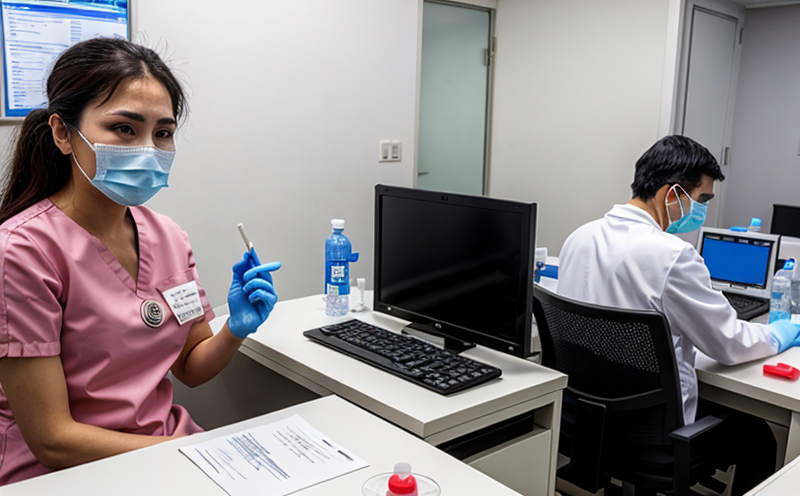Porcine Reproductive and Respiratory Syndrome Virus (PRRSV) Serology Testing
The Porcine Reproductive and Respiratory Syndrome Virus (PRRSV) serology testing is a critical diagnostic tool used in the veterinary and agricultural sectors to monitor and manage the spread of this virus among pig populations. PRRSV, also known as blue ear disease or swine reproductive and respiratory syndrome, causes significant economic losses by affecting both reproductive performance and respiratory health in pigs.
PRRSV serology testing is particularly valuable for farms experiencing suboptimal reproductive outcomes such as late-term abortions, stillbirths, weak piglets, and reproductive inefficiency. It helps to identify the presence of antibodies against PRRSV in serum samples from pregnant sows or gilts. This test aids in differentiating between infected animals and those that have been vaccinated or exposed to the virus.
The primary goal of serology testing is to provide an early indication of viral activity within a herd, allowing for proactive management strategies such as isolation, vaccination, or culling. By identifying carrier pigs before they exhibit clinical symptoms, this test can help prevent the spread of PRRSV and minimize its impact on herd productivity.
The standard procedure involves collecting blood samples from selected animals and analyzing them using ELISA (Enzyme-Linked Immunosorbent Assay) or IFA (Indirect Fluorescent Antibody) techniques. These methods detect specific antibodies against the virus, providing a quantitative measure of exposure level in the tested population.
Understanding the prevalence and distribution of PRRSV within a herd is essential for effective biosecurity measures. Regular monitoring through serology testing ensures that timely interventions can be implemented to control outbreaks before they escalate into full-blown epidemics. Additionally, this type of testing supports breeding programs by identifying potential dams with maternal immunity who may pass protective antibodies onto their offspring.
For quality managers and compliance officers responsible for animal health protocols in large-scale operations, accurate serology results are crucial for maintaining regulatory standards and ensuring ethical treatment practices towards livestock. In research settings, PRRSV serology testing plays a vital role in studying viral dynamics over time and evaluating new diagnostic tools or vaccines.
The importance of PRRSV serology cannot be overstated; it serves as both an indicator of current infection status and a predictor for future outbreaks. By leveraging this knowledge, farmers can make informed decisions about herd management practices that will lead to healthier pig populations and sustainable business operations.
- Q: Why is PRRSV serology testing important?
- PRRSV serology testing helps identify carriers of the virus before they show clinical signs, enabling early intervention measures such as isolation or culling to prevent further spread within the herd.
Applied Standards
The PRRSV serology test follows internationally recognized guidelines and standards set by organizations like OIE (World Organization for Animal Health), USDA (United States Department of Agriculture), and EU directives. These institutions provide frameworks that ensure the consistency, reliability, and accuracy of diagnostic methods employed across different regions.
Specifically, ISO 15189:2012 provides requirements for quality management systems in medical laboratories which PRRSV serology testing labs must adhere to when performing this type of analysis. Additionally, reference materials provided by NIBSC (National Institute for Biological Standards and Control) play a crucial role in standardizing the calibration and validation processes used during test development.
For optimal performance, it is recommended that laboratories participating in PRRSV serology testing maintain proficiency through participation in external quality assessment schemes such as EQAPLANET or LIRN. These programs provide regular feedback on analytical precision and accuracy ensuring continuous improvement of laboratory practices.
Industry Applications
In the context of clinical & healthcare testing, PRRSV serology finds extensive application across various sectors including veterinary medicine, swine production farms, research institutions, and government agencies involved in public health monitoring. It supports decision-making processes related to herd management by providing objective data on viral prevalence rates within specific populations.
Research applications include studying the epidemiology of PRRSV outbreaks, evaluating vaccine efficacy, and investigating genetic diversity among different strains circulating worldwide. Farms benefit from regular testing which allows them to adopt best practices for biosecurity measures while optimizing breeding programs based on maternal immunity status.
Government bodies responsible for enforcing animal health regulations rely heavily on accurate PRRSV serology results when implementing control strategies aimed at preventing the introduction or spread of this disease into regions where it has not yet established itself. Such information also assists in setting national targets for herd certification programs designed to enhance international trade opportunities.





